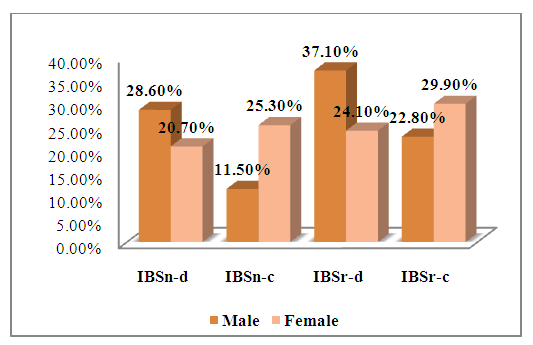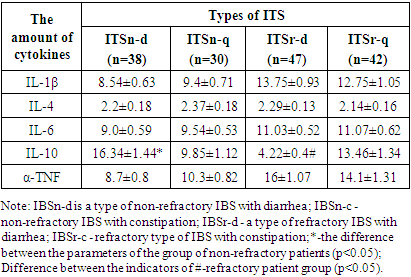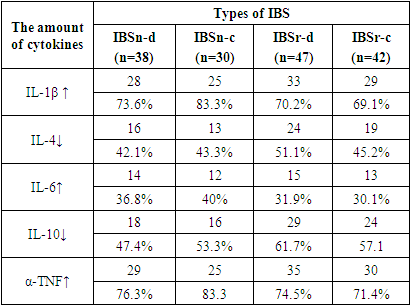-
Paper Information
- Next Paper
- Previous Paper
- Paper Submission
-
Journal Information
- About This Journal
- Editorial Board
- Current Issue
- Archive
- Author Guidelines
- Contact Us
American Journal of Medicine and Medical Sciences
p-ISSN: 2165-901X e-ISSN: 2165-9036
2023; 13(7): 894-896
doi:10.5923/j.ajmms.20231307.10
Received: Jun. 15, 2023; Accepted: Jun. 27, 2023; Published: Jul. 8, 2023

Analysis of Cytokine Status in Irritable Bowel Syndrome
Makhmudova Lola Izzatilloevna
Department of Faculties and Hospital Therapy, Nephrology and Hemodialysis, Bukhara State Medical Institute, Bukhara, Uzbekistan
Correspondence to: Makhmudova Lola Izzatilloevna, Department of Faculties and Hospital Therapy, Nephrology and Hemodialysis, Bukhara State Medical Institute, Bukhara, Uzbekistan.
Copyright © 2023 The Author(s). Published by Scientific & Academic Publishing.
This work is licensed under the Creative Commons Attribution International License (CC BY).
http://creativecommons.org/licenses/by/4.0/

Currently, intestinal functional disorders are the most common pathology among patients with a gastroenterological profile.The study was conducted in the department of gastroenterology of the multidisciplinary medical center of Bukhara region, and 157 patients treated in the inpatient setting with IBS were selected. Patients with IBS were divided into two groups: non-refractory (ITSn – 68 patients) and refractory (IBSr – 89 patients) of IBS. Depending on the expression of clinical symptoms, patients with IBSn-d (diarrhea) - 38 (24.2%), IBSn-c (constipation) - 30 (19.2%), IBSr-d - 47 (29.9%) and IBSr-c was allocated to 42 people (26.7%). The results of personal research showed that in irritable bowel syndrome, which is considered a functional disease of the intestine, the imbalance of cytokines is considered to be of great importance, especially this imbalance is characterized by a decrease in the amount of anti-inflammatory cytokine IL-10.
Keywords: Irritable bowel syndrome, Cytokine, Low-grade inflammation
Cite this paper: Makhmudova Lola Izzatilloevna, Analysis of Cytokine Status in Irritable Bowel Syndrome, American Journal of Medicine and Medical Sciences, Vol. 13 No. 7, 2023, pp. 894-896. doi: 10.5923/j.ajmms.20231307.10.
1. Introduction
- Currently, intestinal functional disorders are the most common pathology among patients with a gastroenterological profile [1].According to the revised Rome IV criteria, this group of diseases includes irritable bowel syndrome (IBS), functional constipation, functional diarrhea, functional abdominal distension, nonspecific functional bowel disorders, and opioid-related constipation [1,2,3,4].The role of "low-grade mucosal inflammation" in the intestinal mucosa in some patients with IBS is actively discussed [1,5,6]. Degranulation of mast cells leads to the release of biologically active substances (leukotrienes, tryptase, heparin, prostaglandins) and stimulates the differentiation of T cells into functional effector cells. Obviously, therefore, in patients with IBS, CD3 + T cells, CD8 + T cells increase not only in the intestine, but also in the peripheral blood, which in turn causes minimal intestinal inflammation [7].The results of studying cytokine levels in peripheral blood are conflicting. Many sources of literature indicate an increase in the level of IL-1β, IL-2, IL-6, IL-8, TNF-α, and a decrease in the level of IL-10 in blood serum. Some researchers have found normal levels of α-TNF, IL-6 and IL-10 in the blood of patients. However, there is no correlation between the amount of cytokines in the intestinal wall and peripheral blood [7].The aim of the study is to evaluate the status of pro-inflammatory and anti-inflammatory cytokines and fecal calprotectin in various forms of irritable bowel syndrome.
2. Material and Methods
- The study was conducted in the department of gastroenterology of the multidisciplinary medical center of Bukhara region, and 157 patients treated in the inpatient setting with IBS were selected. The diagnosis of IBS was made based on the Rome IV criteria (2016), and the Bristol scale of stool patterns was used to determine the clinical form of IBS. The average age of patients is 33.2±0.8 years.Patients with IBS were divided into two groups: non-refractory (IBSn – 68 patients) and refractory (ITSr – 89 patients) of IBS. Depending on the expression of clinical symptoms, patients with IBSn-d (diarrhea) - 38 (24.2%), IBSn-q (constipation) - 30 (19.2%), IBSr-d - 47 (29.9%) and IBSr-q was allocated to 42 people (26.7%).All patients underwent esophagogastroduodenoscopy (FUGINON. FUGI FILM EPX-2500, 2014, Japan; FUGI FILM-EG-530PF, 2014, Japan), colonoscopy (FUGI FILM-EG-530FL, 2014, Japan), stool examination for dysbacteriosis, ultrasound examination of internal organs (Vivid S-60, 2014, Norway), cytokine analysis - IL-1β, IL-4, IL-6, IL-10, α-TNF (Vekor-Best reagents) and fecal calprotectin (De medi tec reagents) were examined.
3. Results and Discussion
- Among patients with ITS, individuals with IBS with diarrhea predominated, which is not entirely consistent with literature data. Patients were divided by gender as follows: men - 70 (44.5% of the total number of research participants), women - 87 (55.5%) (Fig. 1).
 | Figure 1. Gender ratio in different forms of IBS |
|
|
|
|
4. Conclusions
- Thus, literature sources and personal research results showed that in irritable bowel syndrome, which is considered a functional disease of the intestine, cytokine imbalance is considered to be of great importance, especially this imbalance is characterized by a decrease in the amount of anti-inflammatory cytokine IL-10. Such changes indicate the importance of cytokines in the pathogenesis of functional disorders, as well as the importance of systemic immune-inflammatory mechanisms in the development of IBS. Since the imbalance of cytokines manifests the dynamics and intensity of immune disorders in functional diseases of the gastrointestinal tract, the assessment of cytokine status is of important diagnostic and prognostic value.
 Abstract
Abstract Reference
Reference Full-Text PDF
Full-Text PDF Full-text HTML
Full-text HTML


